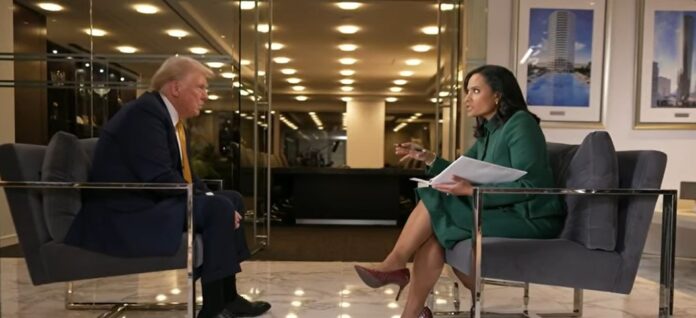President-elect Donald Trump’s commitment to pardoning individuals prosecuted for their involvement in the events of January 6, 2021, is a bold and necessary corrective measure. This promise, reiterated in his December 8 interview with Kristen Welker on NBC’s Meet the Press, highlights what many believe to be politically motivated actions under the Biden administration. Here’s why these pardons are warranted and should be supported.
1. Selective Prosecution and the “Two-Tiered Justice System”
In his NBC interview, Trump expressed frustration with what he described as a “corrupt” justice system, claiming it unfairly coerced January 6 defendants into plea deals by threatening excessively harsh sentences. He underscored this point by explaining how defendants often faced an ultimatum: “You’re going to go to jail for two years or for 30 years.”
This disparity becomes stark when compared to the relative leniency granted to participants in the 2020 protests, which caused billions in property damage and resulted in deaths. Many of those individuals avoided significant legal consequences, while over 1,500 January 6 participants have been charged, with 900 pleading guilty under intense pressure. Trump’s remarks point to a clear imbalance: a justice system that disproportionately targets political dissidents.
2. Misrepresentation of Events
The mainstream narrative surrounding January 6 frequently exaggerates the severity of events. While it is often labeled an “insurrection,” the only person killed that day as a direct result of the unrest was Ashli Babbitt, an unarmed Trump supporter, shot by a Capitol Police officer. Claims of police officer deaths related to the riot have been repeatedly debunked; no officers were killed during the events.
Furthermore, many individuals who were arrested had minimal or no involvement in violent acts. Some were not even in the Capitol building and were swept up in a broad, and arguably overzealous, investigation. Trump’s insistence on reviewing cases individually ensures that blanket assumptions about the accused will not dictate their fates.
3. Harsh Detentions and Questionable Jail Conditions
During his interview with Kristen Welker, Trump described the jail conditions for January 6 defendants as “filthy” and “disgusting,” echoing reports of inhumane treatment. Numerous accounts detail solitary confinement, denial of bail for nonviolent offenders, and restricted access to legal counsel.
Such conditions disproportionately punish individuals whose alleged crimes often pale in comparison to those committed during other politically charged protests. Trump’s proposed pardons aim to address these inequities, which have tarnished the perception of a fair and impartial justice system.
4. The Weaponization of Justice
Trump’s criticisms extend to the broader political motivations behind the prosecutions. The House Select Committee on January 6, spearheaded by figures like former Rep. Liz Cheney and Rep. Bennie Thompson, framed the events as an organized coup attempt. Yet evidence has shown that many participants acted spontaneously, without centralized coordination.
Trump also pointed out the committee’s partisan nature during his NBC interview, calling for its members to be jailed for their roles in what he described as a “witch hunt.” While he clarified that he would not direct his incoming Attorney General, Pam Bondi, to target political opponents, he expressed confidence that his administration would act independently to address corruption.
5. Clemency as a Tool for Justice
The U.S. Constitution grants presidents the power of clemency precisely for situations like this—to correct systemic overreach and restore balance. Trump’s vow to review cases individually is a measured approach that balances justice with fairness, distinguishing between those who engaged in violent or extreme behavior and those who were caught up in the broader political crackdown.
By acting decisively on day one, Trump sends a message that the justice system must be impartial and not a tool for political retribution. Clemency for these individuals is not an endorsement of unlawful actions but a necessary response to prosecutorial overreach and the erosion of civil liberties.
Conclusion: Pardons as a Step Toward Justice
President-elect Trump’s promise to pardon January 6 defendants underscores a commitment to fairness in a polarized judicial environment. His decision to confront selective prosecution and harsh treatment of political dissidents offers a path toward restoring public confidence in the justice system. Pardons, when applied judiciously, ensure that America remains a nation of equal treatment under the law, rather than one where justice serves only those in power.
References and Further Reading
- Hanna Panreck, “Donald Trump says he’ll pardon Jan. 6 rioters on day one,” Fox News, December 8, 2024. Fox News (Retrieved: December 9, 2024).
- Lalee Ibssa, “Trump promises pardon for Jan. 6 rioters on his first day,” ABC News, December 8, 2024. ABC News (Retrieved: December 9, 2024).
- Nathan Layne and Andrew Goudsward, “Trump vows to pardon Jan. 6 defendants on Day One,” Reuters, December 8, 2024. Reuters (Retrieved: December 9, 2024).
Disclaimer:
This article is an opinion piece that provides analysis, commentary, and educational insight on recent news topics, informed by reliable sources. It reflects the author’s sole opinion, and neither the newspaper nor its website, as a news, commentary, and educational platform, bears responsibility for any misinterpretation or consequences arising from this analysis. For the latest breaking news and official results, refer to the news organizations cited above. This article does not constitute primary reporting.




